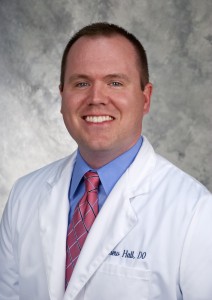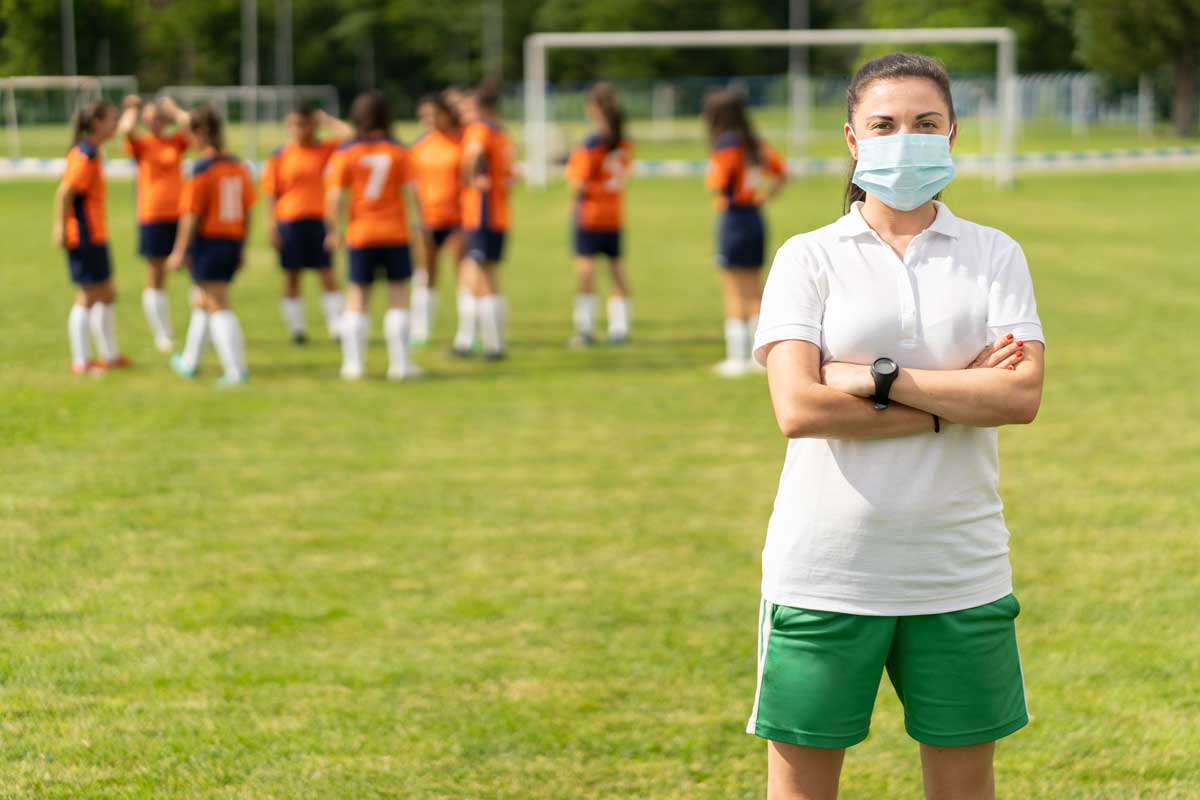To play or not to play? That is the question at all levels of athletic competition throughout the world. The pros are giving it a shot. Many U.S. colleges have suspended or altered their fall sports seasons. But Connecticut, which closes the summer among the states seeming to be doing the best with COVID-19 infection control, appears ready to push ahead with high school sports. UConn Today asked two UConn Health sports medicine experts to share their thoughts.
Both Dr. Allison Schafer and Dr. Matthew Hall are nonoperative sports medicine physicians who specialize in injury prevention and serve as team physicians for UConn athletics.
What are some potential benefits to playing fall sports, even during a pandemic?
Schafer: The good things about continuing are just the good things about sports. It’s great for the kids’ mental health aspect. Everybody’s been cooped up inside for a while, which is quite difficult. So not only does it provide physical benefits of helping the kids stay fit, but also mental health benefits of getting those endorphins released and just helping with their overall mental health. I think other things that it helps are things like keeping kids out of trouble, giving them a purpose and something to do, which are kind of the just general benefits of participation in team sports.
Hall: It is certainly great benefit to sports participation, individual or team, and the majority of the high school-level athletes are doing that because they want to at high school level. High school for most of them is kind of where things will end. Obviously there are health benefits by participating, from a cardiovascular standpoint, but also a mental health standpoint to be able to have some type of outlet.
How does the risk side of it look to you?
Hall: When you look at what the flip side is, you’re trying to find some things that, can they participate in this way, at this distance, with a mask, that’s still safe, that they can develop skills and still minimize their risk. The risk side of it is substantial. There’s developing concern about cardiovascular complications related to this that could have lasting effects on a young person. I don’t think anybody really has the answers to that, and that’s what we’re all struggling with right now. We want in the worst way to get back to those things that we value and that have great value, but at what cost?

Schafer: If kids and patients do contract it, it’s not only obviously that individual, that high school student, that middle school student, it’s their family as well, now at risk, and then anybody their family has come in contact with, especially as some people resume work. Obviously the pool of people who could be contracting that is much greater. There are also very specific health implications that we’re finding with athletes. And this is one of the things that I think is important is for athletes and active people that have had COVID, there are some increased screening records for returning to sport with things like cardiac testing. We have found, in especially the hospitalized patients, that this virus likes to affect the lungs, and likes to affect cardiac issue. So I think that’s another layer of it. That is just really now getting talked about as colleges return to campus and we start talking about fall sports is, what are the things that could be the negative downstream effects of the virus once you’ve “recovered” from it.
What about those who did have COVID-19 and have recovered?
Schafer: The American Medical Society of Sports Medicine has come out with some recommendations recently for testing – more focused for the college population and the professional or Olympic-type population – anybody who has had symptoms of COVID and then COVID-positive, because we are finding downstream effects of the damage that it does to your lungs and your heart tissue. One of the main diseases that can affect your heart that they’re finding is something called myocarditis, an inflammation of your heart muscle. Although sudden cardiac death in athletes is very rare, myocarditis is one of the leading causes of that. So you kind of make those associations, and yes, it’s kind of a downstream thing, but we don’t know, especially athletes who have had quite severe symptoms, we don’t know the quality necessarily of their lungs in their heart as they get back to activity unless we look into to that. So right now there’s a recommendation out: If you’re returning as a collegiate athlete and you had severe symptoms of COVID, really the recommendations are that you get an EKG, that you possibly get an echocardiogram of your heart, that you see a cardiologist. We want to make sure that everybody’s protected. We don’t know exactly what the downstream effects are going to be.
We are doing that at UConn, testing our student athletes pretty aggressively, because we have the ability to do that. But for a lot of smaller schools and high schools, that’s probably not an option because of resources.
How do we explain high school sports taking place this fall while many college programs are suspending their fall seasons?
Hall: I think the college situation is hard. We’re in the process of just trying to get college kids back onto a campus safely, and then you throw in this wrinkle of, they have to the travel. And in some of these events –football, eventually college basketball – it takes a lot of people to put on an event like that, even in the absence of fans. And now you’ve got to travel on from place to place, how do you do that safely, how do you coordinate all that? And then I’ll also say, they’re supposed to be student athletes. You don’t have the control that you might have in the NBA’s situation, where they’re all isolated and they’re not leaving a single place. That’s a much more controlled environment. So I think the travel piece is a big one. The travel definitely adds a big complexity to that.
What are you telling your patients?
Schafer: I think there’s the one conversation that happens throughout the summer regarding, what can we do, where can we exercise, and should we should wear a mask? I think if you’re out running and you’re away from other people, like you’re running in a more secluded area, then it’s perfectly fine not to run with a mask on. As gyms opened up, I really encouraged my patients who really wanted to get back in the gym to just do it as smart as they could, to make sure they’re wearing a mask, to make sure they’re sanitizing and cleaning their equipment down, that they’re washing off when they get home from the gym, that they’re not adjusting their mask too much while at the gym.

And then there’s the whole other talk of what to do if you’ve had it, and I’ve just really been encouraging not only my patients, but my friends who have young kids, my friends who are athletes themselves, and active individuals that if you had COVID or you were very certain you had COVID but it was before testing was widely available, to make sure that you’re getting a physical before returning back, that you’re talking to somebody who’s aware of these guidelines for cardiac testing. Certainly everybody doesn’t need cardiac testing, and if you’re not returning to vigorous sport, or if you’re somebody who is going out and walking a few miles a day at a brisk pace, you’re probably not that person who needs advanced cardiac workup unless you’ve had cardiac disease to begin with.
Hall: Other than that basic stuff about masks and basic hygiene to help with infection control, I don’t think anybody should feel bad about the fact that they say, “Well, I’m a little bit uncomfortable with this, so I’m just not going to participate this year.” If you feel like you are comfortable and your parent is comfortable and you are going to participate, then that’s your decision. But I think that people should honestly be very clearly given the ability to not participate and not feel like they’re going to be punished for that. Everybody has to decide what level of risk they’re willing to take on based on their comfort level. For some, that’s not going to school at all, for some of it’s going to school part time, and for others it’s going to be, “I’m okay with taking the risks for them to play football or soccer or lacrosse” or whatever it is that that is going on, and that’s a parental decision that people take on. It’s such a moving target. I just think we have to be patient and we have to wait for the science to kind of catch up.
Given the reliance on self-reporting as a way to control the spread of COVID-19, how important is it for student athletes to be in touch with their bodies, know what to look for, and be forthcoming with their symptoms?
Schafer: Being forthcoming with your symptoms with this virus I think is everything right now. There’s a lot of stigma around becoming a COVID-positive patient, and I think that causes people to almost withdraw a little bit, people don’t want to say that they have symptoms for fear of being taken out at work, being taken out of sport, being taken out of school, all of those things. Also just the social stigma of it, I think, is a big and a real thing right now. One thing that we tell our athletes, though, especially as UConn students return, is, if you don’t report your symptoms it’s only going to be worse for you down the road. Likely you’re not going to get good care, you’re going to be out longer, or you’re going to infect more people on your team and then your team’s going to be out longer, and then you don’t have full training. So the quicker symptoms are reported, the quicker people can be isolated and cared for appropriately, the less effect it’s going to have for your teammates. We’re hoping that in the sports world, that will always help people report because it’s more than just you when you’re part of a team. So that kind of philosophy, I think, tends to help resonate with athletes.



